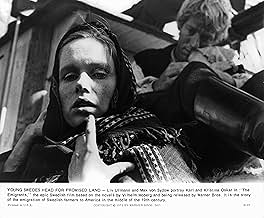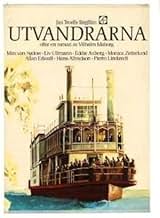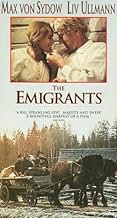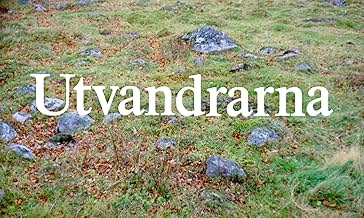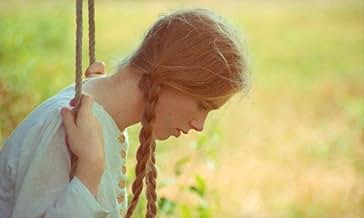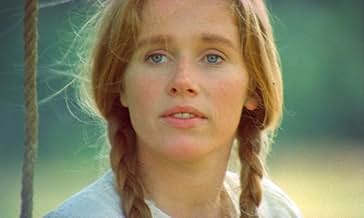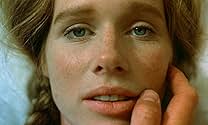Una familia de granjeros lucha por seguir adelante en una tierra rocosa y difícil, en la Småland (Suecia) de mediados del siglo XIX, hasta que decide embarcarse en un peligroso viaje hacia A... Leer todoUna familia de granjeros lucha por seguir adelante en una tierra rocosa y difícil, en la Småland (Suecia) de mediados del siglo XIX, hasta que decide embarcarse en un peligroso viaje hacia América.Una familia de granjeros lucha por seguir adelante en una tierra rocosa y difícil, en la Småland (Suecia) de mediados del siglo XIX, hasta que decide embarcarse en un peligroso viaje hacia América.
- Dirección
- Guionistas
- Elenco
- Nominado a 5 premios Óscar
- 8 premios ganados y 11 nominaciones en total
- Nils
- (as Svenolof Bern)
- Dirección
- Guionistas
- Todo el elenco y el equipo
- Producción, taquilla y más en IMDbPro
Opiniones destacadas
As a historical document 'The Emigrants' is a great film. It shows us a moment of crisis in the history of Sweden and Europe, one of those periods that produced the great human migrations to America in the 19th century. From the point of view of American history it is a film about the Zero Moment of the American dream. There is, of course, a lot of naivety in the image that future immigrants have about the New World. Even the most educated of them owe their knowledge of reading propaganda books, written in order to encourage emigration, which contained many inaccuracies, intentional or not. But precisely this naivety is one of the pillars of the American dream. The road is littered with obstacles and not everyone who starts it reaches the promised shore. The power and quality of the film also lies in the description of the psychology and motivation of those who leave their country and the places where they were born and lived forever to embark on an adventure that seems exceptional today. And again, we cannot help but compare what we see in the film with the psychology and motivations of many of today's migrants.
The extremely thorough reconstruction of life in 19th-century Swedish villages contributes to the authenticity and credibility of what we see on screen. The film has an exceptional distribution with Max von Sydow and Liv Ullmann in the lead roles. With its over three hours 'The Emigrants' has a format and duration that can be a test for today's viewers. Those who will respond to the challenge will enjoy a quality film show about an episode of history that resonates in the present.
I was trying to explain one of the most unique things about the film (and its 2nd part, The New Land) to my brother but I was having a hard time finding the words. Finally, "transfixed" was what I was looking for. The film is long but it held me "transfixed" with nearly every scene. The shots are long. The dialog is often sparse. The soundtrack is almost non-existent. Rather, the director holds one nearly spellbound by "showing" rather "telling" the story. The imagery and expressions on the actors' faces and their silent actions relate most of what makes this film so powerful.
As the viewer, you feel almost like you are right there with the characters, sharing the moments along side them. One becomes immersed in what is happening as if you are there. The powerful empathy that the film manages to generate within the viewer is really quite amazing given the lack (or maybe due to the lack) of modern cinematic styles and techniques.
Another thing about this film that is incredibly impressive is that the viewer really gets a sense of how someone migrating from Sweden at the time would see things and think. The perspective is fresh and unapologetically authentic. Unlike many films set in the past, it does not "dumb-down" any aspect by modernizing or "updating" anything to make it easier for a modern audience to relate to (language, mannerisms, music, etc.). One of my biggest peeves about modern films set in the past is that, other than the wardrobe, everything else is modern... modern language, modern manners, modern politics/norms, modern music (electric guitar in the soundtrack of a "western" film?). It is also refreshingly unpolluted by modern-day political correctness.
This is really a fantastic work of art that in many ways, gets better with time as it is so accurate and truthful to the situation and period. The 2nd part, "The New Land" is equally as fantastic. It is not a "sequel" per se, but rather the filmmaker realized he would need several hours to accurately portray the story set out in the book and one movie would be too long. So, it was essentially shot as one long movie but released in two parts in back-to-back years.
This film really provides the viewer with an authentic sense of the times and the situations many emigrants went through in the mid-19th century. One of the best film discoveries I've made in a long time. Highly recommended.
The characters, played by Ingmar Bergman regulars Max von Sydow, Liv Ullmann and Allan Edwall, face poor harvests, starvation, poverty, religious persecution and even false rumours of bestiality. They look to the US as a place where a farmer can become rich, with even American slavery looking better than their previous situation. Getting to North America, however, will take a rough voyage in which our heroes will face disease, lice and death, and come into psychological conflict with each other. This makes for a strong drama.
Surely one of the best foreign films of the 1970s and a great addition to the strong cinematic year 1971, The Emigrants is an understated but still compelling film, and I look forward to The Criterion Collection's restoration.
There are lots of little touches in the film, such as the family's reaction to being on a train for the first time, reminding us that railroads were a monumental innovation in the 19th century. The priest who is with them along with his followers because they were persecuted in Sweden doles out some sublime thoughts, such as reminding them that even lice are god's creation and that suffering because of them allows one to understand suffering in others better and to empathize. He also dispenses a lot of nonsense, such as the idea that they'll magically understand English when they land in America per his understanding of the Bible, and in general trying to attribute everything that happens in their little lives to divine favor or displeasure operating on them in ways he's always trying to explain after the fact.
The family is incredibly naïve about planning beyond the idea of 'going to America', and their rosy optimism of all the wonderful things they would find there. It's interesting that on the one hand they find a fellow Swede in Minnesota living in what his mother sees as squalor, but on the other hand, that they're free to stake out claims to beautiful, arable land, which is hard to fathom today. They are in some sense disillusioned, but in another sense, are in a paradise of sorts. There are lots of moments where fantasy and reality meet in the film, but it's in nuanced ways and never overplayed.
It's a fantastic moment when we get a brief glimpse of slaves in chains on a steamboat, and in those poor eyes get a heartstopping reminder that to others, coming to America was a very different, horrifying nightmare of an experience. So much for the idea that the young men had read about in Sweden, that "many of the slaves have better houses, food, and circumstances than peasants in Europe." Unfortunately while we might see a few Native Americans at one of the stops, the idea that the land these people from Sweden are claiming had been inhabited by people who were going through genocide is not articulated by the film, though it is in the sequel, 'The New Land.'
In terms of production value, there is a lot to love about the realism. We're not flooded with grand images of landscapes, and even the beauty we see in the woods or fields has a natural ruggedness to it. It's a very small moment, but at one point director Jan Troell gives us the sun on the water during a very serene moment with slow undulations, which I found simply exquisite, and such a contrast to the harshness of the ocean journey. The performances from Max von Sydow, Liv Ullmann, and the rest of the fine cast are unaffected and natural. The version I saw had unfortunately been dubbed in English though, and I think seeing it in Swedish with English subtitles would have been infinitely preferable, and much more in keeping with the spirit of the film, so if it's an option for you, I would certainly seek it out.
¿Sabías que…?
- TriviaWhen filming the scene towards the end, where Karl Oskar walks off to find a better place for his settlement, director Jan Troell forgot to yell, "Cut." Max von Sydow just kept walking and walking, waiting for a "cut", and nobody realized until they took lunch.
- ErroresOn the train west a character shows an American silver coin and yells out it has "In God We Trust" on it. The scene is the 1850s and the motto was not added to American silver coins until 1867.
- Citas
Arvid: What do you think it will cost to ship us there?
Robert: Around 200 riksdaler.
Arvid: Ya, well, might as well forget it. 200 riksdaler. I'll never have that much.
Robert: You don't have it?
Arvid: I will go anyway. We can travel to America on foot.
Robert: Nah, there's an ocean. You can't go on foot to America.
Arvid: Do you mean there is no way?
Robert: I'm afraid there is not. America is an island.
Arvid: Damned ocean.
- Versiones alternativasThe USA television version, retitled "The Emigrant Saga", consists of this film plus its sequel, Nybyggarna (1972), joined and re-edited together in chronological order and dubbed in English.
- ConexionesEdited into Spisok korabley (2008)
Selecciones populares
- How long is The Emigrants?Con tecnología de Alexa
Detalles
Taquilla
- Total en EE. UU. y Canadá
- USD 1,156,554

